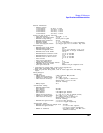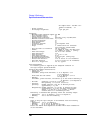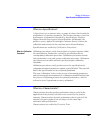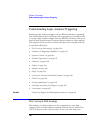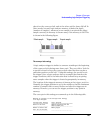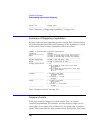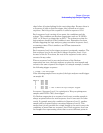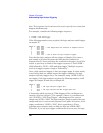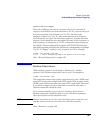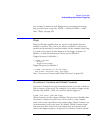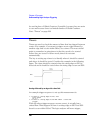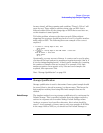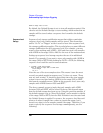
195
Chapter 4: Concepts
Understanding Logic Analyzer Triggering
edge before it begins looking for the next rising edge. Because there is
a sequence of steps to find the trigger, this is known as a trigger
sequence. Each step of the sequence is called a sequence level.
Each sequence level consists of two parts; the conditions and the
actions. The conditions are Boolean expressions such as “If ADDR =
1000” or “If there is a rising edge on SIG1”. The actions are what the
logic analyzer should do if the condition is met. Examples of actions
include triggering the logic analyzer, going to another sequence level,
or starting a timer. This is similar to an If/Then statement in
programming.
Each sequence level in the trigger sequence is assigned a number. The
first sequence level to be executed is always Sequence Level 1, but
because of the Go To actions, the rest of the sequence levels can be
executed in any order.
When a sequence level is executed and none of the Boolean
expressions are true, the logic analyzer acquires the next sample and
executes the same sequence level again. As a simple example, consider
the following trigger sequence:
1. If DATA = 7000 then Trigger
If the following samples were acquired, the logic analyzer would trigger
on sample #6.
Sample # ADDR DATA
1 1000 2000
2 1010 3000
3 1020 4000
4 1030 5000
5 1040 6000
6 1050 7000 <- This is where the logic analyzer triggers
7 1060 2000
In essence, Sequence Level 1 is equivalent to “Keep acquiring more
samples until DATA=7000, then trigger”.
If a Boolean expression in a sequence level is met, another sample is
always acquired before the next sequence level is executed. In other
words, if a sample meets the condition in Sequence Level 1, another
sample will be acquired before executing Sequence Level 2. This
means that it is not possible for a single sample to be used to meet the
conditions of more than one sequence level. Each sequence level can
be thought of as representing events that occur at different points in



